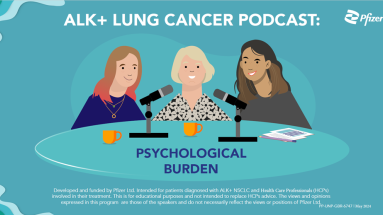Managing nutritional concerns: lack of appetite
Appetite loss is a common symptom experienced by patients undergoing cancer treatment. You may feel as though you have lost your desire to eat or you may not feel like eating very much. Appetite loss can have more than one cause, including nausea and vomiting, changes in how things taste, fatigue, pain and stress. You may experience appetite loss for only a few days after treatment or throughout your treatment regimen. Not eating enough can quickly lead to weight loss, dehydration and weakness and fatigue. Eating nutritious food will help you to preserve your strength and energy, improve how well you recover from the side effects of treatment and maintain your weight.1
Tips for people experiencing appetite loss2,3
- Speak with a dietitian certified in oncology nutrition to discuss ways to add more calories and protein to your diet
- You can try eating smaller and more frequent meals (five or six times a day) instead of three large meals – aim to eat something at least every 2 or 3 hours
- You could increase your calorie intake by adding extra butter, olive oil, mayonnaise, sauces, dressing, gravy, honey, jam, cheese and nuts to your meals
- If you need extra protein, try including meat, fish, eggs, yoghurt, cheese, beans and nuts to your meals and snacks. Dried milk powder mixed in gravies, soups and sauces can also help
- Keep nutritious snacks with you when you travel so you can eat whenever you need. High protein snacks such as peanut butter on oat cakes, granola bars, nuts, yoghurt and cheese can be helpful
- Try drinking high calorie liquids such as fruit juice, milkshakes, smoothies and protein drinks
- If recommended by your doctor or healthcare team, you could try nutritional supplements or liquid meal replacements
- Try drinking fluids half an hour before or after meals as some people find consuming beverages with meals can make them feel fuller
- Exercise can help stimulate your appetite – ask your doctor if you should increase your activity
- Try to make mealtimes enjoyable – invite friends or family over or play relaxing music
More information is available at Macmillan Cancer Support
It can help to talk to your doctor or nurse if you consistently have a lack of appetite and are losing weight.
References:
- Appetite Loss. Cancer.Net. Accessed August 2022.
- Elliot, L. Symptom Management of Cancer Therapies in Lesser M, Ledesma N, Bergerson S, Trujillo E, eds. Oncology Nutrition for Clinical Practice. Oncology Nutrition Dietetic Practice Group of the Academy of Nutrition and Dietetics: 2013. pg 115.
- Macmillan Cancer Support. If you have changes in appetite. 2019. Accessed August 2022.
The health information contained herein is provided for educational purposes only and is not intended to replace discussions with a medical professional. All decisions regarding patient care should be made with a medical professional.










